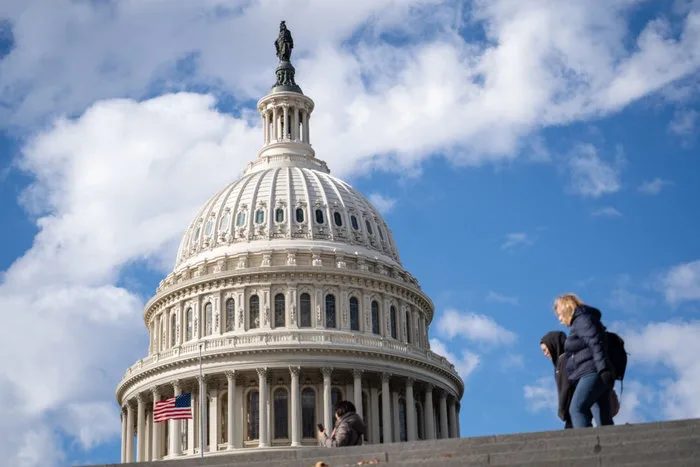By Joseph Lord
The U.S. Senate has voted to end the Democratic filibuster on a funding bill, which is set to end the government shutdown as the impasse neared its 41st day.
On Sunday evening, following an unusually busy weekend at the Capitol that saw bipartisan negotiations and all-nighters by legislative staff, enough Democrats had voted for the proposal to all but ensure that at least 60 senators will agree to invoke cloture on the funding bill.
Finalization of the procedural vote was delayed as Sen. John Cornyn (R-Texas) was not present as the vote sat at 59–40.
Hours after the vote began, Cornyn rushed to the Capitol from Dulles International Airport in Virginia, coming after a day of brutal flight delays nationwide as a consequence of the shutdown’s impacts on air traffic control. As Cornyn cast the 60th vote for the bill around 11 p.m. ET, cheers from other members in the chamber were audible.
The final tally was 60–40, achieving the bare minimum needed to break the filibuster.
A vote on final passage of the bill will still need to be held before the revised legislation can be sent to the House of Representatives for a vote.
One Republican, Sen. Rand Paul (R-Ky.), an outspoken budget hawk, voted against the package.
Seven Democrats have cast affirmative votes for the package, including Sens. Dick Durbin (D-Ill.), Tim Kaine (D-Va.), Jeanne Shaheen (D-N.H.), Catherine Cortez Masto (D-Nev.), Jacky Rosen (D-Nev.), Maggie Hassan (D-N.H.), and John Fetterman (D-Pa.).
Sen. Angus King (I-Vt.), who caucuses with Democrats, also voted for the package.
Though a funding bill was already passed by the House, the bill taken up by the Senate differs, and the House will need to take a separate vote on the issue before it can be sent to President Donald Trump’s desk.
The House has been out of session for weeks, and currently isn’t scheduled back until Nov. 17.
However, it’s likely that the House will return early this week to vote on any Senate-passed agreement and put an end to the shutdown.
The proposed stopgap funding agreement, led on the GOP side by Senate Appropriations Committee Chairwoman Susan Collins (R-Maine), resulted from days of backroom negotiations.
Shaheen, King, and Hassan led the opposition in the negotiations.
The multi-part deal includes the House-passed “clean” funding bill to punt government funding into January, a vote on a three-part appropriations package dubbed a “minibus,” and a promise from Senate Majority Leader John Thune (R-S.D.) that the Senate will take up a vote on extending Affordable Care Act (ACA) subsidies later this year.
The minibus appropriations bill wrapped into the package would greenlight full-year funding for three sectors of the government, ensuring that these sectors will maintain funding even if there’s another shutdown in 2026.
Speaking about the minibus on the Senate floor ahead of the vote, Collins encouraged passage of the agreement, noting that it came about in part because her staff “missed an entire night’s sleep to get this package together.”
The deal will put an end to the longest government shutdown in history, as disruptions to air traffic, social program payouts, and other government services increased pressure on both sides to find a way forward.
Previous attempts by Senate Republicans to reopen the government, tallying 14, had failed as Democrats continued to withhold their support for a measure to end the shutdown.
Medicaid and ACA Subsidies
The central issue of the ongoing shutdown goes back to the health care provisions of the One Big Beautiful Bill Act, President Donald Trump’s signature tax and spending bill.
Included in that bill are roughly $930 billion in cuts to Medicaid that helped to finance a provision that made permanent tax cuts that were originally enacted in 2017.
The One Big Beautiful Bill Act also does not extend tax subsidies for Affordable Care Act (ACA) policies, which are due to expire at the end of 2025. These subsidies reduce the cost of ACA health insurance policies for buyers.
Democrats have pushed for a reversal to the Medicaid cuts included in the One Big Beautiful Bill Act, citing Congressional Budget Office and other estimates that the cuts could result in more than 10 million Americans losing health coverage, higher health insurance premiums, and hospital closures.
Democrats have also demanded a one-year extension of ACA subsidies as a minimum requirement for their support to end the shutdown, referencing analyses that suggest ACA premiums could more than double next year if the subsidies aren’t extended.
Recently, Democrats have focused more on the latter demand.
Republicans have said that the One Big Beautiful Bill Act’s cuts to Medicaid were entirely centered around waste, fraud, and abuse, and have characterized the Democrats’ demands to reverse these cuts as excessive.
Trump and his congressional allies have said that the cuts largely prevent illegal immigrants and able-bodied young men from receiving Medicaid benefits.
Speaking to the press after reports of the deal began to surface, Trump said, “We’ll never agree to give any substantial money, or any money to really prisoners, illegals, to come into our country, and I think the Democrats understand that.”
Though the GOP has been more open to an extension of ACA subsidies, Republican leaders have rejected taking up the issue until the government has been reopened.
As part of Sunday’s funding agreement, Thune told Democrats that a standalone vote on ACA subsidies would be held in December.
An extension of these subsidies could win enough GOP support in the upper chamber to pass, as purple seat Republicans in both chambers whose constituents rely on the funding have expressed openness to considering the idea.
It’s unclear whether House Speaker Mike Johnson (R-La.) would bring the bill for a vote in the lower chamber.
Speaking on the Senate floor ahead of the vote, Sen. Bernie Sanders (I-Vt.) encouraged opposition to the deal, expressing skepticism that a bill providing for ACA subsidy extensions would either be taken up in the House or signed by Trump.
“If this vote succeeds, over 20 million Americans are going to see at least a doubling in their premiums,” Sanders said. “For certain groups of people, it will be a tripling and a quadrupling of their premiums.”
Senate Majority Leader Chuck Schumer (D-N.Y.) also announced that he would be opposing the stopgap, citing healthcare policy concerns.
Minibus
Also announced as part of the deal, the Senate will vote on a so-called “minibus” appropriations package to fund several sectors of the government for a full year.
This minibus package would include three of the 12 government appropriations bills that need to be passed annually. Failure to pass one or all of these bills before the funding deadline results in a partial or complete government shutdown.
Details of the minibus were released by the Senate Appropriations Committee on Sunday ahead of the deal being announced. The package would fund legislative branch operations, military construction and the Department of Veterans Affairs, and the U.S. Department of Agriculture (USDA) and its operations.
USDA oversees nutrition assistance programs such as SNAP and the subsidiary Women, Infants, and Children (WIC) program. Funding the agency for a full year would prevent SNAP funding lapses at least through November 2026.
Currently, Congress has not finalized passage of any of the 12 spending bills.
The Associated Press and Jacob Burg contributed to this report.





